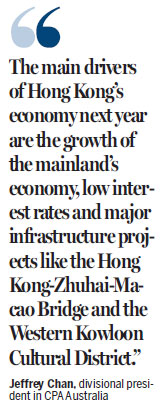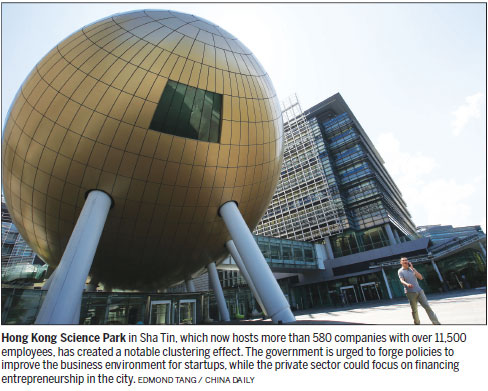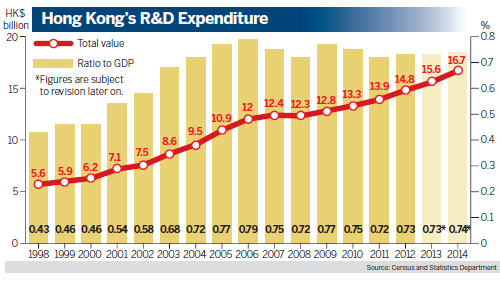Dual formula to lift competitiveness
Updated: 2016-10-12 09:36
By lin wenjie in Hong Kong(HK Edition)
|
|||||||
Former finance chief Antony Leung Kam-chung has urged both the government and the local private sector to secure Hong Kong's competitive edge after recent surveys showed the city was losing ground against its rivals.
Leung, who was financial secretary from 2001 to 2003 and currently chief executive officer of property developer Nan Fung Group, said private enterprises should fund startups and innovation, and the government should play a more pro-active role in gathering talents and providing favorable conditions for business development.
He told the media last week that although the SAR's competitiveness is falling, as indicated in the latest global competitiveness rankings, he still believes it remains an attractive place for young entrepreneurs due to its long-established intellectual property protection system and ample funds.

To maintain the city's competitiveness, Leung suggested that the government focus on policies that will improve the business environment for startups, while the private sector could pitch in by concentrating on investment to support entrepreneurship.
"As innovation and investment are the engines of economic growth, the SAR government needs to provide solid preferential policies to attract young entrepreneurs. These talented people can create jobs and bring money to the city. Meanwhile, the government also needs to review the current conditions and limits on innovation and remove outdated contents."
Leung said the government should work toward a new breakthrough in regional cooperation, particularly with cities in the Pearl River Delta region.
"Shenzhen is the birthplace of many influential high-tech companies, and Zhuhai provides favorable conditions for bio-pharmaceutical enterprises. If Hong Kong deepens collaboration with those cities, we can create an innovation hub in the region, which I believe will be able to rival with the San Francisco Bay area in the near future," he said.
Ushering in more startups should be propelled by private sector investment, Leung said, as it was not easy for the government to provide funding.
"The implementation of the (Principal) Officials' Accountability System has hindered the government from making risky investments."
In a bid to push innovation and support young entrepreneurs, Leung set up new venture New Frontier two months ago, aiming to build and invest in companies across various sectors. New Frontier already owns several regional healthcare and internet companies, with aggregate investment reaching 100 million yuan ($14.9 million).
"We should give young people hope," he said.
According to the 2016 global competitiveness rankings released by the World Economic Forum in July, Hong Kong slipped from seventh in 2015 to ninth, as the city struggled to evolve from a global financial center to an innovation-led economy.
"With the exception of the 'market size' pillar, innovation remains the weakest aspect of Hong Kong's performance and the business community consistently cites the capacity to innovate as their biggest concern," the report said.
This echoed the findings of another recent survey by CPA Australia - one of the world's largest professional accounting bodies. It found that 56 percent of Hong Kong-based professionals in the accounting, financial and business sectors expect the city's competitiveness to continue falling next year.
Respondents also believed the Chinese mainland and Singapore are the main threats to Hong Kong's competitiveness.
"The results from the survey show there's a real appetite for reforms to improve Hong Kong's international competitiveness," said Alex Malley, chief executive of CPA Australia.
The organization also encouraged the SAR government to provide greater support to spur businesses and entrepreneurs to undertake innovation in Hong Kong. It also called for the government to provide more information to small- and medium-sized enterprises to improve their understanding of the Belt and Road Initiative and its benefits.
The survey also found 58 percent of respondents expect Hong Kong's economy to remain the same or grow less than 2 percent in 2017.
"The results reflected that actions to improve Hong Kong's competitiveness are much needed to provide an important boost to the economy," said Jeffrey Chan, divisional president at CPA Australia.
"The main drivers of Hong Kong's economy next year are the growth of the mainland's economy, low interest rates and major infrastructure projects like the Hong Kong-Zhuhai-Macao Bridge and the Western Kowloon Cultural District. Meanwhile, respondents identified the political environment as most likely to have a negative impact on the economy. E-commerce, healthcare and technology are the industries that are viewed as having the highest growth potential," he said.
cherrylin@chinadailyhk.com


(HK Edition 10/12/2016 page9)